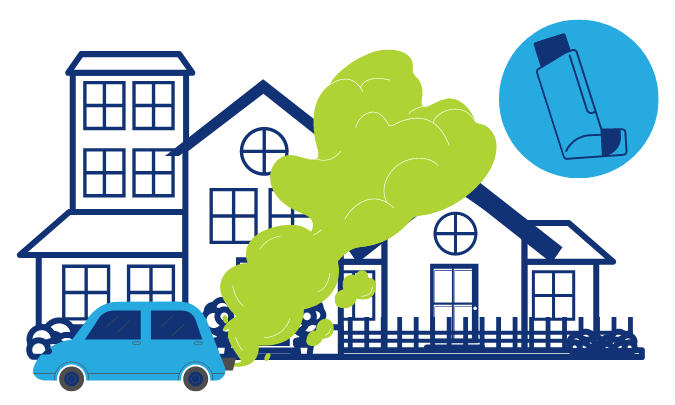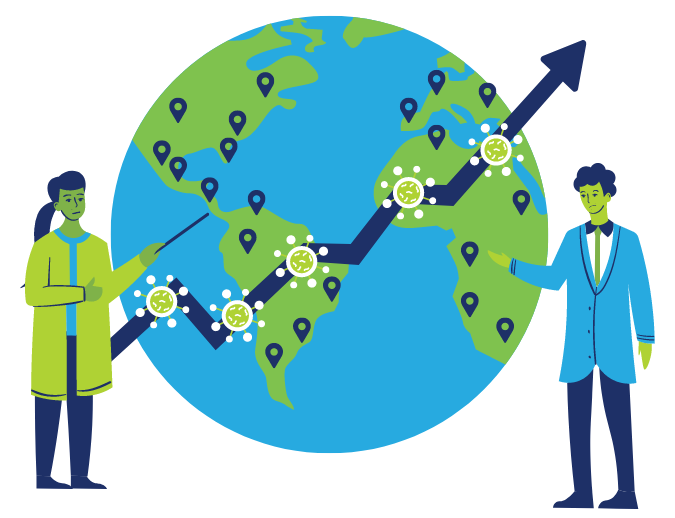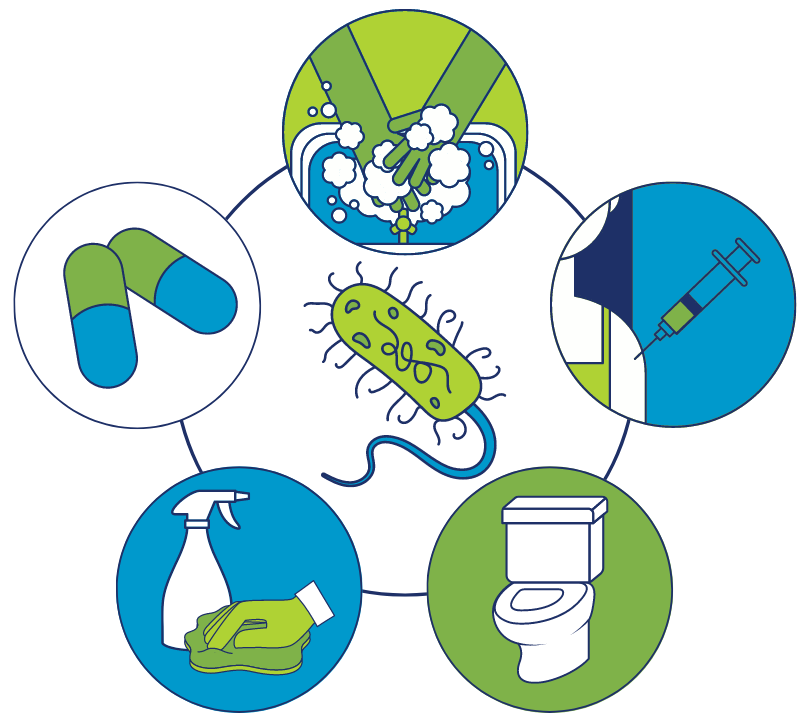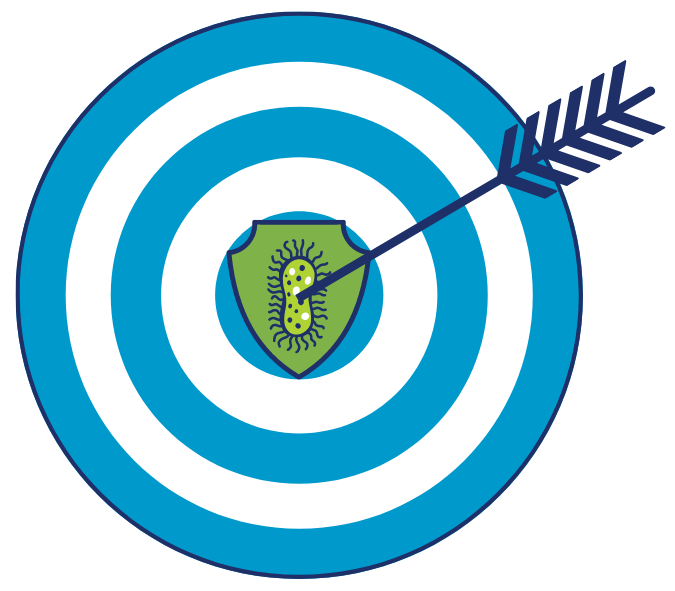
Antimicrobial resistance – the emergence of new drug-resistant superbugs – is one of the top 10 global health threats, the World Health Organization says.
More than 700,000 people die each year from infections caused by drug-resistant microorganisms – which not only include antibiotic-resistant bacteria but also viruses, fungi, and parasites that can escape the effects of drugs designed to kill them.
Filmmaker Michael Wech illustrates the problem with a series of stories about real people in his documentary “The Silent Pandemic”.
In this episode of One World, One Health, listen as Michael explains why he’s so deeply interested in the dangers of antimicrobial resistance and what he has found out about efforts to curb it.
Maggie Fox
Hello and welcome to One World, One Health, with the latest ideas to improve the health of our planet and its people. I’m Maggie Fox. Planet Earth faces problems such as pollution, climate change, and new and reemerging infectious diseases, and just like all of us on this planet, they’re all linked. This podcast is brought to you by the One Health Trust with bite sized insights into ways to help.
A young German woman who lost her hands and feet to sepsis. A mother in Arkansas who caught methicillin-resistant Staph aureus in the hospital while giving birth, who couldn’t hold her own newborn until she was treated. A Dutch researcher who found that the tulip bulb industry was spreading drug-resistant fungus. These and other stories are featured in “The Silent Pandemic,” a documentary that dramatizes the issue of antimicrobial resistance. Drug-resistant superbugs go beyond antibiotic-resistant bacteria, and include viruses that defy multiple drugs, fungal infections that shake off entire classes of medicines, and malaria parasites that thrive in the face of multiple pharmaceuticals. In this episode, we’re chatting with Michael Wech, who wrote and directed “The Silent Pandemic.” Michael, thank you so much for joining us.
Michael Wech
Thanks for having me.
Maggie Fox
You’ve done a wide range of work, looking at tennis star Boris Becker, Hungarian Prime Minister Viktor Orban, Formula One driver Michael Schumacher. But you keep coming back to health issues, and especially drug-resistant superbugs. You directed “The Silent Pandemic,” out last year, but also a piece in 2019 about resistance fighters. What’s the special appeal to you?
Michael Wech
Well, I was hospitalized with a bacterial infection back in 2015, twice actually, in two years’ time, and resistance was not the issue. But the antibiotics really helped me overcome this disease that I had. I started for the first time in my life really to question, what is the real value of antibiotics. And I wasn’t really aware, of course I knew what antibiotics were, but I wasn’t aware of how precious they are and how much they’re needed by doctors. And in my case, I don’t want to say they saved my life, but they really helped me overcome my disease.
Maggie Fox
And in this documentary, the story arc, you start with a US patient who was at risk of disease because of antibiotic resistance. She had cystic fibrosis. You feature a company that dropped its efforts to make antibiotics because it just doesn’t pay to make them.
Then you interview a young German woman who lost her hands and feet to sepsis, and it not only didn’t help when she got treatment, but the delay in treatment cost her her hands and feet. How did you choose these particular examples?
Michael Wech
Well, we have several patient stories in this documentary. And I think first of all, it I think it helps because everybody can understand their ailments, everybody can understand what they went through, even though these are probably cases that most of us have never [had] any contact with. We never hear about them, our neighbors and friends maybe never had these diseases, but they do exist. So I think first of all, it really appeals to everybody to understand the problem, which is a very complicated issue actually.
These two cases that you mentioned, I think the first case of Ella Balasa, a young woman from Richmond, Virginia, I think entails the whole story of antibiotic resistance, because in her case, very, very unlike mine, her life depends on the functioning antibiotics. And she’s starting to realize that she has to take antibiotics every day. But she starts to realize that the treatments she takes no longer work as efficiently as they did. That means resistance is creeping, and for her, it could cost her life. She even goes so far saying that she doesn’t know how long her life will be sustainable without these drugs.
Maggie Fox
Do you think documentaries are an effective way of educating people about these kinds of problems?
Michael Wech
Yeah, I think very much so. I think we’re living in a very, very complex world. The issues that we have to deal with and the amount of information coming towards us, I think it’s very difficult for everybody to just digest that on a day-to-day basis.
The issues are growing both in importance, but also in complexity. It’s not so easy to understand, for example, climate change, and it’s not so easy to understand antibiotic resistance. It is very difficult to explain in probably two or three minutes. You might be able to explain, but I think it takes this emotional appeal so people can not only understand in terms of digesting the information, but I think it strikes their heart if they get it presented in a storytelling mode, and this is what I’m trying in my work.
I’m combining the scientific knowledge, but I’m not only carrying the scientific knowledge from A to B, I’m trying to translate it so it appeals to everybody, without losing the information on the way.
Maggie Fox
In making this documentary, what did you discover that surprised you?
Michael Wech
I think the most surprising story was the entry of antibiotic resistance genes, one really has to say, into the environment. It’s a story about a fungus, Aspergillus fumigatus, in the Netherlands, and this fungus is inhaled by everybody. Everybody’s inhaling the spores of this fungus that is found in decaying plant material. It’s not harmful, but our immune system deals with it, you inhale 200 spores, our immune system takes care of this. But people whose immune system is compromised, they have a very hard time. It attacks them very, very strongly. So they need antibiotics, or in this case, antifungals to deal with it.
And in the Netherlands, they discovered that there’s a resistance growing in these fungi against the existing fungicides, and they were not finding any solution. They were asking themselves the question, why does this resistance appear in a patient who has never been treated with this antifungal medicine before? And they started to [do] their research and they found out that it is in the environment.
I’m shortening it up a little bit, because it’s a real, it’s like a detective story, and you will see it in the film, what they come up with is they are able to show how the use of antifungals in agriculture, in this case in the flower industry, which is extremely strong in the Netherlands — they make a lot of money with flowers — the treatment of these flowers with antifungals, which has the same active compound as in the antifungals for humans, is bringing this resistance into the environment.
And I’ve never seen the whole picture of what people usually refer to as One Health, but it’s a very abstract concept. I’m always thinking, well, how can I make people understand, what is One Health? It’s very complicated. This example just shows how you do something in agriculture, not really related to human medicine at all, it’s very far away, but it affects the way people take antifungal medicine in the hospital. And that was very striking.
And then in exploring these problems, you’ve discovered that there are some solutions as well.
Well, yeah, the solution would be, first of all, you have the flower industry accept that they are causing this resistance, which is very, very difficult, because why should they? So you need to come up with really sound and hard scientific proof, which happened. The scientists in Holland were able to convince the flower industry to do something about it and stop the use of these antifungals in their agricultural work.
Maggie Fox
And these stories we’ve been talking about up to now look at the West, but what’s going on in the rest of the world?
Michael Wech
Well, I think it’s obvious that the problem of antibiotics is much, much stronger in the Global South. We’re having another look, for example, at Pakistan. For the first time in 2016 extensive drug-resistant typhoid was found. Three [female] scientists from the Aga Khan Hospital in Karachi were able to detect the source. Where did this extensive drug resistance typhoid break
out? They were able to find it. Also, at the same time, they were able to convince the Pakistani government, which is a very, very strong step that they took, to make use of an emergency vaccine, which by coincidence had just been released by the WHO and Pakistan was one of the first places where this vaccine was put into use very, very quickly, and over a short period of time, they were able to [vaccinate] hundreds of thousands of children, saving their lives and also stopping the spread of this extensive drug-resistant typhoid all over the world.
And I think this is why when you say the Global South, it seems far away, but these bugs travel. Also, the resistance genes which are found [in] individual pathogens, they also travel with the pathogen or without. So once the mutation is there, the mutation which is causing very specific resistance against one antibiotic is there, and it can stay with a particular pathogen, but it can also be that another bacteria is picking up this resistance mechanism from its neighbor, a different bacteria. That is the main problem and this is why once resistance is out there, it’s just causing problems.
Maggie Fox
What would you advise the average person that they can personally do to help fight this problem?
Michael Wech
One of the most important [pieces of] advice, or one of the most important insights that I personally drew from dealing with the subject is also tied to a patient’s story, a young woman, Christina Fuhrman, who was also in the documentary. Her problem was [that] antibiotic-resistant pathogens developed in her body because of overuse. She’s sort of saying it herself, I have misused antibiotics, I’ve taken it for this, I’ve taken it for that, I’ve taken it for this. So she was taking antibiotics constantly. And in her case, it shows perfectly that an overuse or a misuse of antibiotics leads to resistance. So we must come back to understanding [that] these antibiotics are very powerful drugs, but they only work if we use them extremely carefully, and only when they’re appropriate to use should [we] be taking them.
And nowadays, we’re living in societies where we take them like candy, but there are wonder drugs. In the 1950s, when they were invented, they were hailed as wonder drugs. They save people’s lives in situations where before, people would just die because you couldn’t treat a bacterial infection properly. Now with antibiotics, you can. And in order for this powerful instrument still to be available to us in the future, we must use it carefully and accept that it’s something very, very precious.
Maggie Fox
Michael, thank you so much for joining us.
Michael Wech
Sure. Thank you for having me.
Maggie Fox
If you liked this podcast, which is brought to you by the One Health Trust, please share it by email, LinkedIn, or your favorite social media platform. And let us know what else you’d like to hear about at [email protected]. Thanks for listening.
Transcribed by https://otter.ai
Guest

Michael Wech is the director of two documentaries about antimicrobial resistance (AMR), “Resistance Fighters” and “The Silent Pandemic.” He was born in 1969. He worked as a trainee for the filmmaker and book author Egmont R. Koch and then studied Political Science and International Relations in Hamburg and London and as a scholarship-holder at Bilkent University in Ankara. Since 1998 he has made documentaries for ARTE, ARD, and 3sat.
Credits
Hosted and written by Maggie Fox
Special guest: Michael Wech
Produced and edited by Samantha Serrano
Music composed and sound edited by Raquel Krügel
Transcript edited by Aditi Satyavrath







